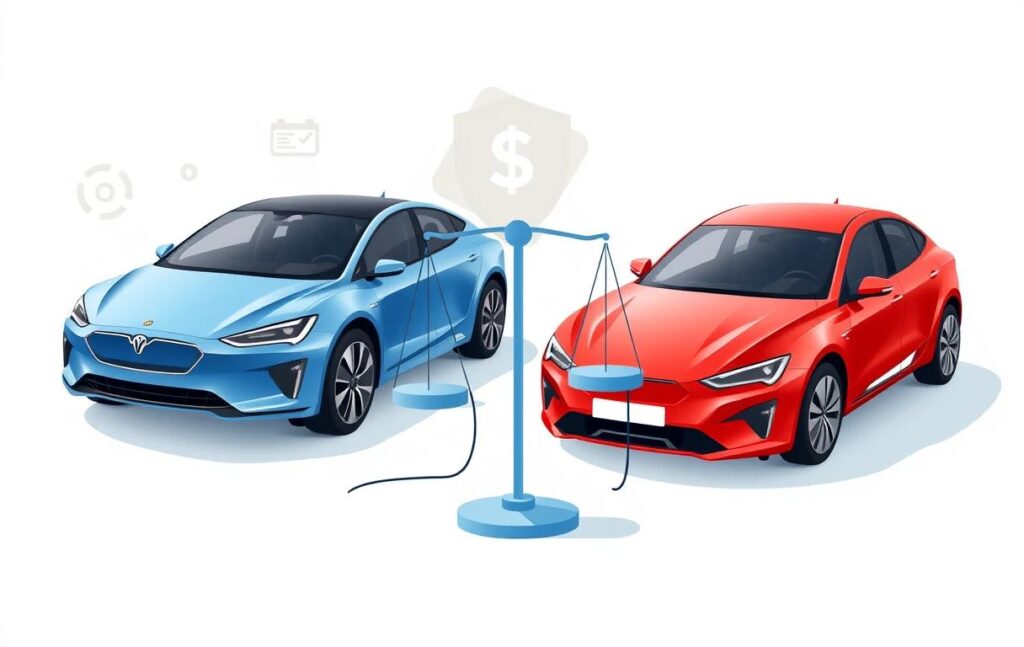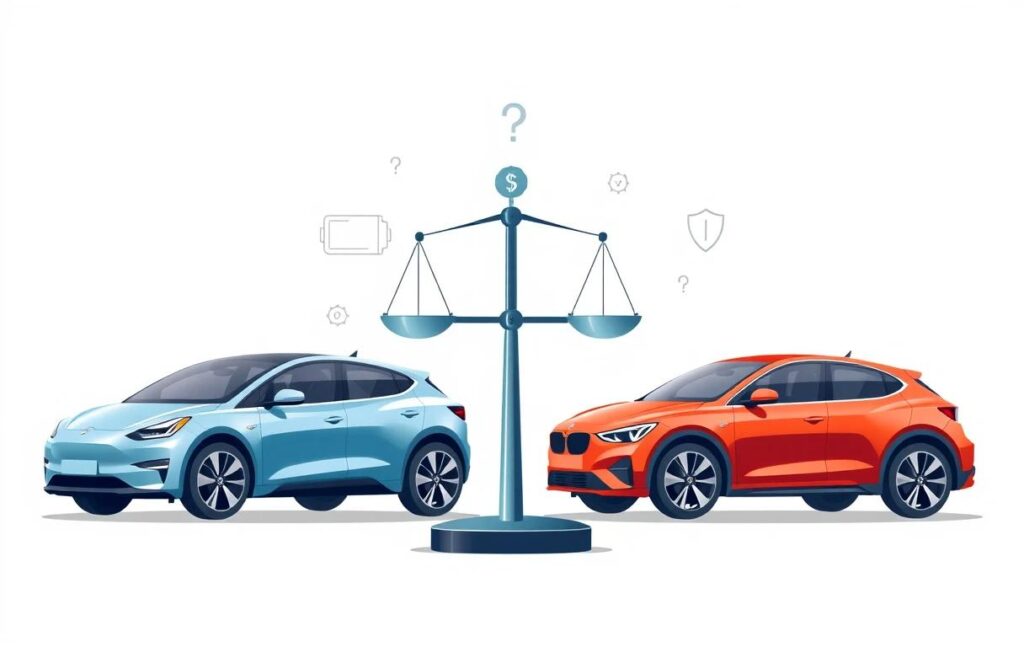Introduction:
Electric cars (EVs) are gaining popularity worldwide due to their eco-friendliness, innovative technology, and long-term cost-saving potential. However, one common question arises when switching to an EV: why is electric car insurance often more expensive than traditional petrol car insurance? In this blog, we will explore the various factors contributing to this price difference, including repair costs, battery expenses, and the technology involved, while also offering tips on how to save on EV insurance.

Table of Contents
Understanding the Higher Insurance Costs for Electric Cars
As the adoption of electric vehicles grows, so does the need to understand their financial implications. One significant cost often overlooked is car insurance. Insurance premiums for electric cars tend to be higher than those for petrol or diesel cars, even though EVs offer long-term savings on fuel and maintenance. This discrepancy can be confusing for many, especially first-time EV buyers. In this blog, we will delve into the key reasons behind the higher insurance costs for EVs and provide insights to make informed decisions.
| Reason | Explanation |
|---|---|
| High Purchase Price | Electric cars are more expensive than petrol cars, which increases insurance premiums. |
| Expensive Battery Technology | Repairing or replacing electric car batteries is costly, which is factored into insurance premiums. |
| Specialized Repairs | Electric vehicles require specialized skills and tools, leading to higher labor costs for repairs. |
| Higher Cost of Spare Parts | Electric car parts, such as electric motors and charging systems, are more expensive than petrol car parts. |
| Limited Data for Risk Assessment | Due to limited historical data, insurers charge higher premiums to offset potential risks. |
| Increased Risk of Total Loss | In case of severe damage, the cost to replace the battery can exceed the car’s value, leading to a total loss. |
| Discounts and Benefits | Some insurers offer green discounts, government subsidies, or telematics plans to reduce EV insurance costs. |
1. High Purchase Price of Electric Cars
One of the primary reasons for higher insurance premiums is the higher upfront cost of electric vehicles compared to petrol cars. Insurers base premiums on the car’s value, and since EVs are generally more expensive, the insurance costs also rise proportionally.
Example: A mid-range electric car like the Tesla Model 3 typically costs more than a comparable petrol car, leading to higher insurance rates.
2. Expensive Battery Technology
The battery is the most crucial and expensive component of an electric vehicle. If the battery gets damaged, repairing or replacing it can cost thousands of dollars. Insurers factor this high repair cost into the premiums, making EV insurance more expensive than traditional petrol cars.
Key Insight: EV batteries are sensitive to accidents, and even minor damage can require a costly replacement.
3. Specialized Repairs and Limited Mechanics
Electric cars require specialized skills and tools for repairs. The technology used in EVs is advanced and differs significantly from internal combustion engines.
Limited Mechanics: The availability of trained EV mechanics is still relatively low, leading to higher labor charges for repairs.
Impact on Insurance: Insurers account for these higher repair costs when determining premiums.
4. Higher Cost of Spare Parts
Electric cars use unique and often more expensive spare parts compared to petrol vehicles. Components like electric motors, inverters, and charging systems are costly to replace. Additionally, since the EV market is still growing, spare parts are not as widely available, further driving up costs.
Example: A replacement electric motor can cost significantly more than a petrol engine part like a carburetor.
5. Limited Data for Risk Assessment
Electric vehicles are relatively new to the market compared to petrol cars, and insurers have limited historical data to assess risk. Without sufficient data, insurers often set higher premiums to safeguard against potential losses.
Why This Matters: More data on EV safety and reliability could lead to lower premiums in the future.
6. Increased Risk of Total Loss
Electric vehicles are often considered a higher total loss risk in the event of a severe accident. If the battery is significantly damaged, the cost of replacing it may exceed the car’s value, leading insurers to declare it a total loss. This increased risk contributes to higher insurance costs.
Note: This is especially true for older EV models with depreciated value but expensive batteries.
7. Benefits and Discounts for EV Owners
While EV insurance is generally more expensive, many insurers offer discounts and benefits to encourage EV adoption:
Government Subsidies: Some regions provide subsidies or tax breaks for insuring electric vehicles.
Green Discounts: Insurers may offer lower premiums for environmentally friendly vehicles.
Telematics Plans: Usage-based insurance plans can help reduce costs for EV owners who drive less frequently.
How to Save on Electric Car Insurance
- Compare Insurance Plans: Shop around and compare multiple insurers to find the best rates for your EV.
- Choose Higher Deductibles: Opting for a higher deductible can lower your premium.
- Bundle Policies: Combine your EV insurance with other policies like home or health insurance for discounts.
- Install Safety Features: Adding safety features like anti-theft devices or advanced driver assistance systems (ADAS) can reduce premiums.
- Drive Safely: Maintain a good driving record to qualify for no-claim bonuses and discounts.
Conclusion: Weighing the Costs of EV Insurance
Electric cars represent the future of transportation, offering numerous environmental and long-term financial benefits. However, their higher insurance costs can be a deterrent for some buyers. By understanding the factors driving these costs—such as expensive batteries, specialized repairs, and limited data—EV owners can make better decisions and find ways to save on insurance. As technology advances and the EV market matures, insurance premiums are likely to become more competitive, making electric vehicles an even more attractive choice.
FAQs
1. Why is electric car insurance more expensive than petrol cars?
EVs have higher purchase prices, expensive batteries, and specialized repair requirements, all of which contribute to higher insurance costs.
2. Can I lower my electric car insurance premium?
Yes, by comparing plans, bundling policies, and installing safety features, you can reduce your insurance costs.
3. Are there any discounts available for insuring electric cars?
Many insurers offer green discounts, telematics plans, and government incentives for EV insurance.
4. Does the high insurance cost negate the savings from owning an electric car?
While insurance costs are higher, EV owners save on fuel, maintenance, and taxes, which can offset the insurance expense over time.
5. Will EV insurance premiums decrease in the future?
As the market grows and more data becomes available, premiums are likely to become more competitive.


